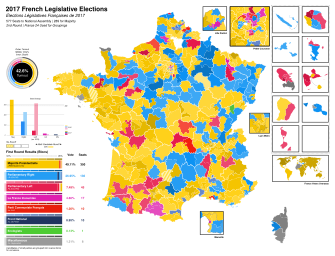
Back الانتخابات التشريعية الفرنسية 2017 Arabic Eleccions legislatives franceses de 2017 Catalan Volby do Národního shromáždění Francouzské republiky 2017 Czech Frankrigs parlamentsvalg 2017 Danish Parlamentswahl in Frankreich 2017 German Γαλλικές βουλευτικές εκλογές 2017 Greek Elecciones legislativas de Francia de 2017 Spanish 2017ko Frantziako hauteskunde legegileak Basque انتخابات مجلس فرانسه (۲۰۱۷) Persian Ranskan parlamenttivaalit 2017 Finnish
| |||||||||||||||||||||||||||||||||||||||||||||||||||||||||||||||||||||||||||||||||||||||||||
All 577 seats in the National Assembly 289 seats needed for a majority | |||||||||||||||||||||||||||||||||||||||||||||||||||||||||||||||||||||||||||||||||||||||||||
| Turnout | 48.70% (first round) 42.64% (second round) | ||||||||||||||||||||||||||||||||||||||||||||||||||||||||||||||||||||||||||||||||||||||||||
|---|---|---|---|---|---|---|---|---|---|---|---|---|---|---|---|---|---|---|---|---|---|---|---|---|---|---|---|---|---|---|---|---|---|---|---|---|---|---|---|---|---|---|---|---|---|---|---|---|---|---|---|---|---|---|---|---|---|---|---|---|---|---|---|---|---|---|---|---|---|---|---|---|---|---|---|---|---|---|---|---|---|---|---|---|---|---|---|---|---|---|---|
This lists parties that won seats. See the complete results below.
| |||||||||||||||||||||||||||||||||||||||||||||||||||||||||||||||||||||||||||||||||||||||||||
Legislative elections were held in France on 11 and 18 June 2017 (with different dates for voters overseas) to elect the 577 members of the 15th National Assembly of the Fifth Republic. They followed the two-round presidential election won by Emmanuel Macron. The centrist party he founded in 2016, La République En Marche! (LREM), led an alliance with the centrist Democratic Movement (MoDem); together, the two parties won 350 of the 577 seats—a substantial majority—in the National Assembly, including an outright majority of 308 seats for LREM. The Socialist Party (PS) was reduced to 30 seats and the Republicans (LR) reduced to 112 seats, and both parties' allies also suffered from a marked drop in support; these were the lowest-ever scores for the centre-left and centre-right in the legislative elections. The movement founded by Jean-Luc Mélenchon, la France Insoumise (FI), secured 17 seats, enough for a group in the National Assembly. Among other major parties, the French Communist Party (PCF) secured ten and the National Front (FN) obtained eight seats. Both rounds of the legislative election were marked by record low turnout.[1]
In total, 206 MPs lost reelection,[2] and 424 (75%) elected MPs were new members. There was a record number of women elected. The average age of parliamentarians decreased from 54 to 48. Ludovic Pajot from the National Rally became the new Baby of the House, being elected at the age of 23.[3] Édouard Philippe, appointed as Prime Minister by Macron following his victory in the presidential election, was reappointed following the second round of the legislative elections and presented his second government by 21 June. The 15th legislature of the French Fifth Republic commenced on 27 June.
- ^ "Résultats des législatives 2017 : revivez la soirée électorale". Le Monde. 18 June 2017. Retrieved 20 June 2017.
- ^ Curtis, John; Dempsey, Noel (17 January 2021). "The 2017 French parliamentary elections".
- ^ Burrows-Taylor, Evie (19 June 2017). "A look inside France's new, younger and less male dominated parliament". The Local. Archived from the original on 19 June 2017. Retrieved 20 January 2021.
© MMXXIII Rich X Search. We shall prevail. All rights reserved. Rich X Search

